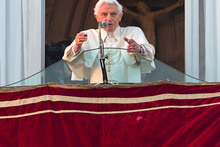Cardinals Need to Act, and Quickly
New Zealand Herald
Yesterday was Pope Benedict's last day in office, but the words customarily used to announce that we have a new Pope, "Habemus Papam", are likely to be a long time in coming. For much has changed in a short space of time. The forced resignation this week of Cardinal Keith O'Brien as Archbishop of St Andrews and Edinburgh demonstrates the intensity of the events through which the Catholic Church is passing. The College of Cardinals that will shortly assemble to make the choice has a difficult task. One characteristic of the papacy that will be hard to maintain is the dogma of papal infallibility. The Vatican Council of 1870 defined it in the following terms: the Pope is "possessed of infallibility" when "he defines ... a doctrine concerning faith and morals to be held by the whole Church". Once the Pope has spoken, the Vatican Council agreed, his definitions "are irreformable of themselves". But the resignation of the Pope, an unprecedented act in modern times, makes the notion of infallibility look distinctly odd. Does it mean that Pope Benedict was possessed of infallibility yesterday but not now since he has begun his retirement? No wonder the Church delayed many centuries before clothing the idea in legal form. Brian Tierney, former professor of medieval history at Cornell University, wrote in his book Origins of Papal Infallibility (1972) that "there is no convincing evidence that papal infallibility formed any part of the theological or canonical tradition of the Church before the 13th century ... only after much initial reluctance, it was accepted by the papacy because it suited the convenience of the Popes to accept it". By convenience is meant the desire to form a bulwark against the march of liberalism. This dogma will surely now wither into disuse. Nor can the office of Pope any longer be considered one that is held on appointment for the rest of one's life. For, if you can resign, you may also be forced to go. These two developments should mean that the power of the cardinals, as opposed to the Pope, would thereby increase. But at a time of momentous change, the cardinals themselves are subject to widespread criticism. So paradoxically, although the election of a new Pope is likely to be a lengthy process, one of the key moments will come very early. By tradition, the cardinals hear two sermons in quick succession before they can proceed to electing a new Pope. These sermons analyse the state of the Church and suggest what qualities are needed in its new leader. Indeed, what the cardinals have to do swiftly is decide what reforms they can accept and then identify the right man to carry them out. Except that Church leaders have little taste for acting swiftly and decisively. Faced with a difficulty, they naturally first turn to scripture to seek inspiration. Then, having come to some conclusions, they inevitably find that what might work well in one part of the Church won't gain any traction in another. The African, European and North American branches have very different traditions and ways of acting. So normally at this point, a paralysis of decision-making would set in and the problem would be shelved for another half-century or so. This time, though, the cardinals have only weeks to reach conclusions that will almost certainly be of historic importance.
|
.
Any original material on these pages is copyright © BishopAccountability.org 2004. Reproduce freely with attribution.
